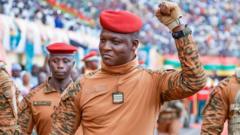Capt Ibrahim Traoré, a 37-year-old military leader in Burkina Faso, is gaining significant popularity through his anti-colonial rhetoric and leftist economic policies. His regime has distanced itself from Western alliances in favor of partnerships with Russia, appealing to a large audience across the continent seeking alternatives to traditional governance.
Embracing the Spirit of Change: Burkina Faso's Capt Ibrahim Traoré Captivates Global Attention

Embracing the Spirit of Change: Burkina Faso's Capt Ibrahim Traoré Captivates Global Attention
The rise of Burkina Faso's military leader Capt Ibrahim Traoré is resonating across Africa and beyond, positioning him as a pan-Africanist symbol against Western influence.
Capt Ibrahim Traoré, the charismatic military ruler of Burkina Faso, has captured international attention with his fervent pan-Africanist stance and criticisms of Western influence. At 37, Traoré has cultivated a persona likened to that of past African leaders, notably Thomas Sankara, a revolutionary icon known for his fight against imperialism. Traoré's rise to power in a 2022 coup marked a dramatic turn, where he chose to sever ties with former colonial power France, pivoting towards a robust alliance with Russia.
His approach has struck a chord with many across Africa who are increasingly questioning the continent's troubled relationship with the West amid persistent poverty despite vast natural resources. As Beverly Ochieng, a researcher at Control Risks, highlighted, Traoré's narrative resonates with those pondering the balance of Western influences and the autonomy of African nations.
Under his leadership, Burkina Faso has implemented significant reforms aimed at maximizing its mineral wealth. The establishment of a state-owned mining company, requiring foreign firms to involve the local populace significantly, showcases his commitment to economic nationalism. Meanwhile, the junta has initiated the construction of a gold refinery and pursued a strategy of nationalizing foreign-owned gold mines, reflecting its intention to ensure the benefits of resource extraction remain within the country.
Amid rising admiration for his revolutionary image, Traoré's governance style has elicited a wave of support on social media, where AI-generated content has portrayed him as an emerging hero. Critics, however, raise concerns over his failure to effectively combat a decade-long Islamist insurgency and the government's crackdown on dissenting voices in civil society.
Traoré’s influence extends beyond Burkina Faso, reaching diasporic communities and even garnering attention from African-Americans and Black Britons, who relate to his anti-colonial messages. Nevertheless, the leader faces opposition from Western leaders like France's Emmanuel Macron, who accuse him of forming alliances that jeopardize stability through neo-colonialist narratives.
Despite being popular amongst the youth, who constitute a significant portion of Burkina Faso's population, Traoré's legacy remains uncertain. His ability to maintain support hinges on establishing peace and governance while avoiding the pitfalls of personalizing power. While Traoré’s impactful speeches and solidified alliances have marked a shift in regional politics, the real test lies in fostering long-term stability and development for Burkina Faso in the face of both internal and external challenges.




















